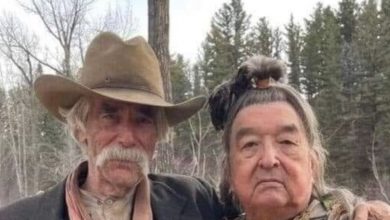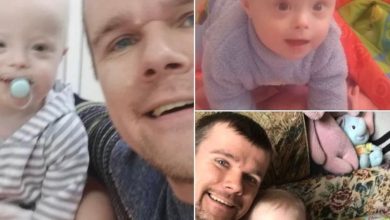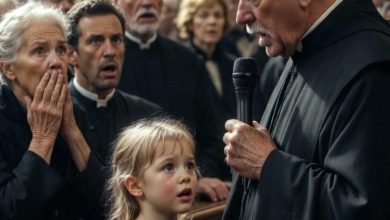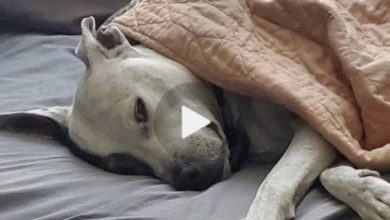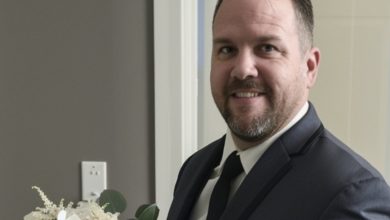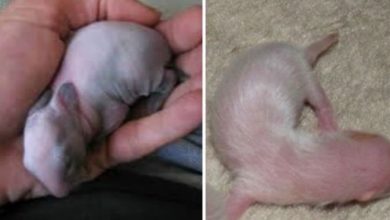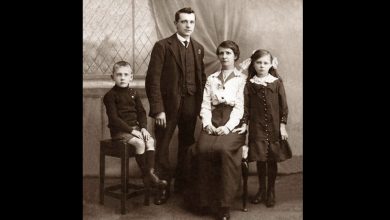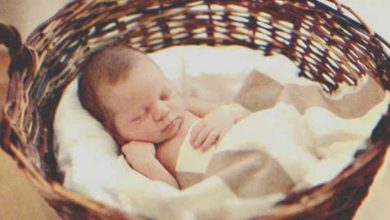“May I take your leftovers, ma’am?” — The moment the millionaire looked into his eyes, everything changed.
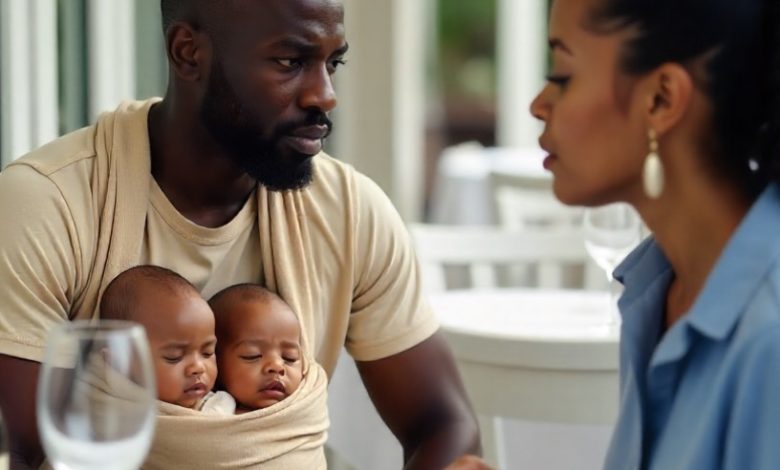
At exactly 8 p.m. on a wet Tuesday, Aurora—the most sought-after dining room in Abuja—glowed like a small galaxy. Tall chandeliers poured warm light onto marble floors buffed so bright they held reflections like still water. Waiters moved in smooth lines. Laughter from rich guests and well-known officials rose and fell like waves. Crystal glasses touched with tiny chimes. The air carried a rich mix of saffron, roast lamb, and the light fizz of opened champagne.
At a quiet table by the wall sat Isabella, thirty years old, known across West Africa as the youngest billionaire in fashion. She wore a gown from her own label, the fabric falling perfectly, the color made to flatter the light. A thin chain of diamonds circled her wrist and winked each time she lifted her hand. Yet something heavy rested on her face, a kind of still sadness jewelry could not hide. She owned homes, cars, a company people admired. She did not own the one thing her heart still wanted: simple, steady warmth.
Her fork floated halfway to her mouth when a thin voice cut through the room like a small bell.
“Excuse me, ma… could I have your leftovers?”
The talk and music stopped at once. Heads turned. Isabella looked to her side.
Kneeling on the clean, polished floor was a man. His shirt was torn at the shoulder. One shoe did not match the other. Dust lay in a light film across his cheeks and brow. Strapped close to his chest with a cloth band were two tiny babies, twins, their faces narrow, their eyes too tired even for tears.
The man did not reach out his hand. He did not look at Isabella as if she were a miracle. His eyes were steady and clear. His voice shook only when he looked down at the babies.
A soft wave of shock passed through the hall. Two security guards moved fast, hands lifted to guide the man away. Isabella raised her jeweled hand.
“Let him stay,” she said.
The guards stopped where they were. The room held still.
A Father Speaks
His name was Daniel. He used to run a small shop in a busy market. He sold things people needed—soap, rice, small tools, cooking oil. Then a chain store opened nearby, prices he could not match, rent that rose month after month. He fell behind. A flood ruined his stock. Loans filled with interest crushed what was left. In a few hard months, the shop closed. The landlord changed the lock. The small life he had built was gone.
Daniel’s wife left soon after. She said she could not live like this. She said the twins would be better off without him. She left them with him anyway and did not return. Relatives offered kind words for a week and advice he could not use. Then they stopped taking his calls. One uncle told him he was cursed. He stopped calling too.
For weeks he slept where he could—on a bench at the bus park, under a tin awning when it rained. Then he found a junkyard where an old bus sat with a broken door and a seat still soft enough to rest on. He cleaned a corner. He made space for the twins. It was not a home, but it was out of the wind.
That night in Aurora, Daniel had not come to ask for money. He had not come to tell his story. He had come only for the food left on plates—a few bites of rice, a piece of lamb, anything to keep the two small mouths fed until morning.
Isabella slid her plate, still full, to the edge of the table. She passed the bread, the chicken, the salad, the glass of water. “Feed them,” she said.
There, on the dining room floor, Daniel used a small plastic spoon, its handle scratched and bent, to guide food into each baby’s mouth. One swallow at a time. He watched their faces after each bite. Not once did he take a taste for himself.
Isabella had met many men who said the right thing, who showed off good manners or kind words when they knew who she was. She had even worn plain clothes and simple shoes more than once to find out who loved her or who loved her money. Yet for a long time she had not seen what she saw now: love at work, love that asked for nothing back, love that did the job in front of it with quiet hands.
When the twins finished, they made the smallest smiles, as if their bodies were too tired for more. Something moved in Isabella’s chest. Money had opened every door she wanted. It had never opened this one.
The Bus With a Song Inside
Curiosity tugged at her as gently as a child. After paying her bill, Isabella left Aurora and, from a careful distance, followed Daniel outside. Rain still fell in a thin sheet. He walked with the twins close and sure, kept to the edges of buildings, and turned down a lane behind a group of closed shops. There, under a high fence topped with wire, sat the rusted bus—windows cracked, paint eaten by time.
Daniel climbed in and laid a blanket over a seat. He lifted the twins out of the sling and wrapped them as if wrapping glass. Then, in a voice that was rough but warm, he sang to them.
“You are my sunshine, my only sunshine…”
The sound filled the bus like a small light. Isabella stood outside the open door, one hand on the metal frame. She had seen grand rooms and slept in silk. And yet here, in a broken bus that smelled of rust and rain, she felt more of what a home should feel like than she had felt in a long time.
She turned and walked back to her car. Her driver asked if she wanted to go home. “Yes,” she said, and then, after a beat, “We have errands in the morning.”
Quiet Help
The next day began early. Isabella sent an assistant to the market with a clear list: jollof rice, grilled chicken, fruit, baby formula, diapers, wipes, clean blankets, a simple stroller. She called a clinic and booked a checkup for two infants. She paid in advance and put the receipt in an envelope. On a small card she wrote, For the twins. Call me if you ever need anything. — Isabella, and added her number.
Near sunset, when the yard was empty, Isabella asked her driver to stop by the bus. She climbed in. The air inside held the quiet smell of old cushions and metal. She set down two coolers, a box of supplies, the envelope, and a new pack of small shirts. On the seat she left the note.
When Daniel came back late, his shoulders low after a day of hauling cement bags at a site, he froze in the doorway. He set one twin on the blanket and stepped toward the coolers as if they might vanish. He opened the first one and stared at the steam rising from the rice. He lifted the lid of the second and saw the chicken, the fruit, the milk.
His hands shook as he read the note. He pressed his lips together. Then he made plates for the twins, small and neat, and fed them first. When they were asleep, he ate too—slowly at first, then with the hunger of a man who does not remember the last time he ate until he was full.
For the first time in months, both father and daughters slept with warm food in their bellies.
A Message in the Rain
Days passed. Isabella went back to work—meetings, designs, fabric samples, the press, the quiet stress of leading a team that watched her every move. At night, though, she found her mind sliding back to the old bus and the song inside it.
Then came the storm. Rain hammered the streets. Wind bent the trees. Late in the evening one of the twins grew hot. Her skin burned under Daniel’s palm. Her small breaths grew fast and thin. He wrapped her and ran, the other twin held tight against his chest.
At the hospital desk a tired clerk shook her head. “Deposit first,” she said, pointing to a list taped to the glass. “No money, no treatment.”
Daniel felt the room tilt. He dug in his pocket and found a few crumpled notes and a handful of coins. They did not cover even half of the number on the paper. He looked down at the baby. Her eyes were dull. Fear rose like water in his throat.
He pulled out his old phone. The screen was cracked and hard to read. The number Isabella had left sat in his messages. He had not used it once. He did not want to be a problem. He did not want to be a story someone told. But his daughter was on fire in his arms.
He typed two words: Help us.
Minutes later, bright lights cut through the rain at the gate. A black SUV stopped hard. The back door flew open. Isabella stepped out, rain flattening her hair to her cheeks, dress clinging to her legs. She saw Daniel and the baby and did not wait for anyone to greet her.
She pushed through the doors and set the baby on the counter with a sure, gentle hand. “Treat this child now,” she said to the staff in a tone that woke the room. “Put every cost in my name. If you make me wait, I will buy this building and we will start again tomorrow without the people who said no tonight.”
It was a wild thing to say, and she might not have meant it word for word. But she meant the heart of it: there would be no more delay.
Nurses moved fast. A doctor appeared. The baby disappeared on a small rolling bed. Daniel sank into a chair and pressed the other twin to his chest. He did not cry. He stared at the floor and counted heartbeats.
By dawn the fever had fallen. The twins lay wrapped and pink, their breaths slow and deep. The doctor smiled at Isabella and Daniel. “She was close,” he said, “but she will be all right now.”
Isabella closed her eyes and let out a breath she had held through the night.
What Money Could Not Do—and What It Could
The waiting room held a long bench and a vending machine that blinked. Isabella sat with Daniel through the dark hours. She bought tea and handed it to him without a speech. She did not leave. She did not ask for thanks. She did not take a picture or tell anyone where she was. She simply stayed.
In the morning, the doctor said more. “Medicine helps,” he said, “but it is not enough. What these girls need now is warmth, clean air, steady food, a roof that doesn’t move in the wind.”
The truth was simple. Isabella felt it land like a stone—and like a key. She had spent years guarding herself, testing men, keeping her world neat because she feared people wanted only her bank account. Yet here was a father who wanted nothing from her but the chance to keep two little lives going. Here was a kind of love that did not need her riches or her name.
It was not romance that grew in her that day. It was respect. It was relief. It was proof that love—the plain, honest kind—still lived in the world, even if it wore a torn shirt and carried a spoon instead of a ring.
What Came Next
Isabella did not make a grand announcement. She did not post a video. She asked her lawyer to draw up a short-term lease for a small, clean apartment close to the clinic. She paid the deposit quietly. She gave Daniel the keys and a list of places that offered work by the day at fair pay. She told him, “You owe me nothing. Keep the girls warm. Call me if you are stuck.” She arranged regular checkups for the twins and kept the clinic number on her phone.
Some days Daniel sent a short message with a picture: two babies in clean shirts, a pot of porridge on a stove, a window open to daylight. Some days Isabella sent a driver with milk and diapers and new blankets when the nights turned cold. Some days they spoke on the phone for three minutes and said only what mattered: “How are they?” “Better today.” “Do you have enough?” “We do, thank you.”
Daniel took every bit of work he could find. He carried bricks, loaded bags, cleaned yards, learned to patch a wall and lay tile. He saved small amounts in a jar. He bought a second-hand stroller and walked the twins in the mornings so they could see trees and not only walls. He kept the apartment neat, as if someone might come to judge him at any time. No one came. He kept it neat anyway.
Isabella kept building her brand. She also began visiting other shelters at night, bringing food, asking names, learning which problems money could solve and which needed time, hands, and patience. She found that even for her—someone for whom money was large and easy—there was still the quiet work of showing up.
The story of Aurora leaked, as stories do. Some people said she was playing a part. Some said Daniel had staged it. Most people said nothing. Isabella did not answer any of it. Daniel did not read it.
The Lesson She Did Not Expect
There came a day when Isabella returned to Aurora for a business dinner. The chandeliers still shone. The marble still gleamed. The servers still moved in lines. She sat at a different table this time and ordered a simple meal. When the plate came, full and perfect, she thought of the old bus and the song inside it. She ate half and asked the waiter to pack the rest. On her way home, she stopped by the small apartment. She did not knock. She left the food by the door, sent a message, and went back to her car with a light feeling in her chest.
On the twins’ next birthday, there was a small cake on a plain table. Two candles. A phone propped up so Isabella could sing along from a meeting room between calls. The twins laughed hard enough to fall over. Daniel laughed too, a tired, joyful sound. It was not a picture for a magazine. It was better.
A Simple Ending
People like to say money can’t buy love. Isabella already knew that. What she learned from Daniel was something else: love does not ask for money first. It asks for time, care, and truth. Money can help after that. It can open a door when a door will not open. It can move fear out of the way so hands can work. But love—real love—shows up before the money and stays after.
The night a thin voice asked, “May I have your leftovers, ma?,” Isabella thought she might be handing over a plate. Instead, she was being handed a mirror. In it she saw who she wanted to be: someone whose heart was bigger than her name, someone who could be counted on when things were hard, someone who did not turn away.
Daniel never forgot the way her jeweled hand rose and stopped the guards. Isabella never forgot the way his fingers steadied a plastic spoon while two small mouths learned to smile again.
In the end, the richest thing in the room at Aurora that night was not the food or the light or the diamonds. It was a father’s steady love and a woman’s decision to answer it with action. And when Daniel asked only for leftovers, what he truly returned to Isabella was the one treasure she could not buy: a living reminder that the heart, when it chooses to care, is the greatest wealth of all.

